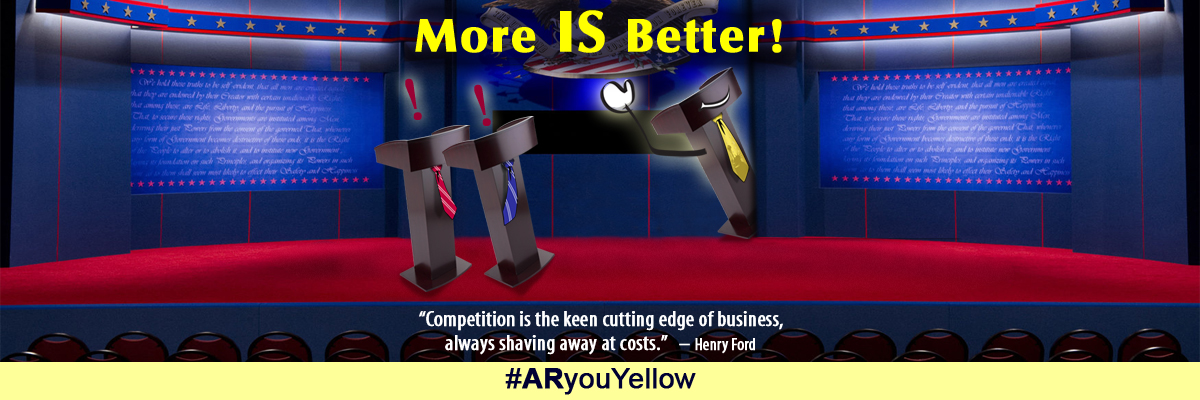In 2018, for the fourth consecutive election cycle, the Libertarian Party of Arkansas fully and proudly participated in our state’s political process, offering Arkansans alternatives to the two major party candidates. Yet, once again, the state’s election laws determined that Libertarian Party will no longer be recognized as a political party. Once again, we must petition to become a “new political party” in order to participate in the 2020 elections.
It was tantalizingly close: Gubernatorial candidate Mark West received 2.9% of the vote – just 0.1% shy of the 3% requirement. But as it stands, that’s the only thing that matters in Arkansas. Official recognition as a political party depends only on the one single race at the top of the ticket. In 2018 it was just one-tenth of one percent in one race that mattered.
Nevermind that the Libertarian Party was the only party to field a full slate of candidates for statewide office in 2018, or that it was the only party to field a full slate of candidates for U.S. Congress in both 2016 and 2018, or that its candidates for state legislature and county offices have often represented the only challenge in otherwise uncontested races. And nevermind that significant numbers of voters choose to express their views by casting votes for Libertarians: In 2018, Libertarian candidates for State Treasurer and State Auditor each received over 25% of the vote, and vote totals were even higher in some legislative and county races.
The 3% rule, applied to just one race at the top of the ticket, makes for a terribly inadequate and flawed measure of what a political party is, or should be. A political party doesn’t just appear out of nowhere to field a winner for governor of the state. Rather, it is built on the hard work of local candidates and volunteers who want to make a difference in their communities, and who make a commitment to participate in the political process to do so. That is what the Libertarian Party of Arkansas seeks to be – and what it is.
But when election laws say that a party must overcome the obstacles of excessive campaign spending, political fear-mongering, and media hype that always accompany a race at the top of the ticket, it sets a bar that is not necessarily too high, but misplaced. By failing to recognize that alternative political parties contribute to a healthy public debate on all levels, the state effectively suppresses such debate. By failing to recognize that significant numbers of voters cast their ballot for alternative political parties, the state effectively disrespects the will of the people.
Restrictive laws on ballot-access and ballot-retention are bad for democracy and bad for Arkansas. We don’t face a problem of too many choices on Election Day. The opposite is true. Over half of the seats up for election in the Arkansas General Assembly were uncontested in 2018 – despite the participation of Libertarians in otherwise uncontested races.
The people of Arkansas deserve more choices and better choices. We appeal to our state legislature to consider and pass legislation that will reform the definition of a political party in Arkansas. In particular, we recommend legislation that recognizes any ongoing political party if any of its statewide candidates has received at least 2% of the vote in either of the past two elections. This is a standard that similar to laws in nearby states. It would better reflect the nature of a political party, its contribution to the political process, and the will of the Arkansas voters.
The legislation we propose, copied below, can be downloaded HERE.
A Bill
For An Act To Be Entitled:
AN ACT TO AMEND THE DEFINITION OF A “POLITICAL PARTY”
Subtitle:
THE POLITICAL PARTY INCLUSION ACT
BE IT ENACTED BY THE GENERAL ASSEMBLY OF THE STATE OF ARKANSAS:
Arkansas Code § 7-1-101, concerning definitions applicable to election law, is amended to read as follows:
(26) (A) “Political party” means any group of voters that at in either of the last two preceding general elections polled for its candidate for Governor in the state or nominees for presidential electors in any statewide election at least three percent (3%) two percent (2%) of the entire vote cast for the office.
(B) A group of electors shall not assume a name or designation that is so similar in the opinion of the Secretary of State to that of an existing political party as to confuse or mislead the voters at an election.
(C) When any political party fails to obtain least three percent (3%) two percent (2%) of the total votes cast at an election for the office of Governor or nominees for presidential electors in any statewide election in two successive general elections, it shall cease to be a political party;
(D) For the purposes of this section, a “statewide election” includes votes for presidential electors, United States Senate, Governor, or any other office that is voted upon throughout the state.

